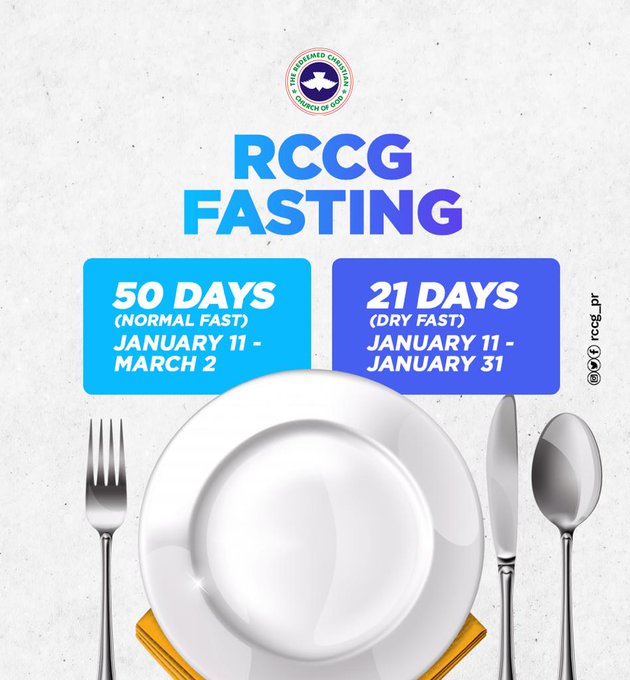RCCG 50 DAYS PRAYERS AND FASTING GUIDE
DAY 1: WED 11TH JANUARY, 2023
TOPIC: THANKSGIVING.

BIBLE TEXT(S): Psalms 136: 1–End, Psalms 101, 105. 1Chronicles 16:8
INTRODUCTION:
Thanksgiving is the art of Giving Thanks to God through the
demonstration or show of gratitude for His goodness and mercies. It is good to give thanks unto the Lord. Psalms 92:1. Hannah expressed her appreciation to God in 1 Samuel 2: 1-10.
PRAYER POINTS:
1. Father, I thank You for Your Mercy endures forever over my life, in Jesus name.
2. Thank You Father for creating me in Your own image in Jesus name Genesis 1:27.
3. Father; I thank You for declaring me good after creating me in Jesus name Genesis 1:31
4. Father; I thank You for giving me Dominion over all the works of Your hands in Jesus name Genesis 1:26.
5. Father; I thank You for saving my Soul by your Mercy, in Jesus name Lamentations 3:22.
6. Father; I thank You for renewing Your Mercies every morning over my life, in Jesus name – Lamentation 3:23
7. Father; I thank You for the ability to sleep and wake up every day, in Jesus name – Psalms 3:5
8. Father; I thank You for the Gift of Salvation for Mankind among whom I am one, in Jesus name. John 3:16-18.
9. Father; I thank You for drawing me to Jesus, Your only Begotten Son, in Jesus name – John 14:6. John 3:27.
10. Father; I thank you for my Sanctification in Jesus name – 2 Thessalonians 2:13
11. Father I thank you for open doors, in Jesus name – Revelation 3:8
12. Father; I thank you for keeping every Members of my family alive in Jesus name – Ecclesiastes 9:4
13. Father I thank you for Divine Protection and Provision, in Jesus name – Genesis 47:12
14. Father I thank you for Divine Visitation, in Jesus name – Job 10:12
15. Father I thank you for Divine Healing, in Jesus name – Job 10:12
Here are some possible prayer points to use before starting a fast:
- Ask God to reveal any unconfessed sin in your life and to give you the strength and grace to turn from it.
- Ask for forgiveness for any wrongs you have committed against others and for the courage to make things right.
- Ask God to give you a heart that is fully surrendered to Him and His will for your life.
- Ask God to help you focus on Him and His Word during the fast, and to give you the strength to resist temptation.
- Ask God to bless the fast and to use it to bring about spiritual growth and transformation in your life.
- Pray for the strength and discipline to stick to the fast, and for protection against any physical or spiritual attacks that may come as a result of the fast.
- Ask God to reveal His purpose and plan for the fast, and to use it to draw you closer to Him.
Why should i fast this year?
There are many reasons why someone might decide to fast this year. Some possible reasons to fast might include:
- To seek a closer relationship with God: Fasting can be a powerful way to draw near to God and seek His will for your life. It can help you focus on prayer and Bible study, and can help you cultivate a deeper sense of spiritual connection with the Lord.
- To overcome a specific challenge or temptation: Fasting can be a helpful tool for overcoming specific challenges or temptations in your life. It can help you to resist temptation and to stay focused on your goals.
- To intercede for others: Fasting can be a powerful way to pray for others. When you fast, you can use the time and energy that you would normally spend on eating and other activities to pray for others instead.
- To seek God’s guidance and direction: If you are facing a major decision or life change, fasting can be a helpful way to seek God’s guidance and direction.
- To grow spiritually: Fasting can help you to grow spiritually by disciplining your body and focusing your mind on spiritual matters. It can help you to develop self-control and to rely more on God’s strength and grace.
Ultimately, the decision to fast should be guided by your own spiritual goals and needs. If you feel called to fast, it is important to be properly prepared and to seek guidance from a spiritual mentor or leader.
How do i break my fast?
Here are some tips for breaking your fast:
- Gradually increase your food intake: After a fast, it is important to gradually increase your food intake to give your body time to adjust. Start with small, easy-to-digest meals and gradually increase the portion size and variety of foods over the course of a few days.
- Avoid overeating: It can be tempting to overindulge after a fast, but it is important to be mindful of portion sizes and to eat in moderation. Overeating can lead to digestive discomfort and may negate some of the benefits of the fast.
- Choose nourishing foods: After a fast, it is important to nourish your body with healthy, nourishing foods. Choose foods that are rich in nutrients and that will help to replenish the nutrients that were lost during the fast.
- Stay hydrated: It is important to stay hydrated after a fast, especially if you have been drinking water but not consuming other fluids. Be sure to drink plenty of water and other hydrating beverages to help your body recover.
- Listen to your body: Pay attention to your body’s needs and cravings after the fast. If you feel hungry, eat. If you feel full, stop eating. Trust your body’s signals and listen to what it is telling you.
It is also important to be mindful of any medical conditions you may have and to consult with a healthcare professional before starting or ending a fast.
What time is ideal to break your fast?
There is no one “ideal” time to break your fast, as the best time will depend on your personal schedule and circumstances. Here are a few things to consider when deciding when to break your fast:
- The type of fast you are doing: If you are doing a water fast or another type of fast that does not involve consuming any food or drink, it is generally recommended to break the fast in the evening, after the sun has set. This allows your body time to adjust to solid food and can help to minimize any digestive discomfort.
- Your personal schedule: Consider your personal schedule and daily routine when deciding when to break your fast. If you have a busy day ahead, it may be more convenient to break your fast in the evening, after you have finished your daily activities.
- Your body’s signals: Pay attention to your body’s hunger signals and cravings. If you feel hungry or are experiencing low energy levels, it may be a good idea to break your fast.
Ultimately, the most important thing is to listen to your body and to choose a time that is convenient and comfortable for you. If you are unsure about when to break your fast, it is a good idea to consult with a healthcare professional or a spiritual mentor for guidance.
Is fasting biblical?
Yes, fasting is biblical and is mentioned throughout the Bible as a spiritual discipline that is practiced by believers. In the Old Testament, fasting is often mentioned in connection with times of repentance, mourning, and seeking God’s guidance. For example, in the book of Joel, it is written: “Yet even now, says the Lord, return to me with all your heart, with fasting, with weeping, and with mourning” (Joel 2:12).
In the New Testament, Jesus and the apostles also practiced and taught about fasting. Jesus himself fasted for 40 days and 40 nights in the wilderness (Matthew 4:2), and He taught His disciples to fast when He said, “When you fast, do not look somber as the hypocrites do, for they disfigure their faces to show others they are fasting. Truly I tell you, they have received their reward in full. But when you fast, put oil on your head and wash your face, so that it will not be obvious to others that you are fasting, but only to your Father, who is unseen; and your Father, who sees what is done in secret, will reward you” (Matthew 6:16-18).
In the early Christian church, fasting was also a common practice, and it is mentioned several times in the book of Acts (for example, Acts 13:2-3 and Acts 14:23). Today, many Christian denominations, including the Redeemed Christian Church of God, continue to practice fasting as a spiritual discipline.
Discover more from Open Heavens and RCCG Daily Publications
Subscribe to get the latest posts sent to your email.
